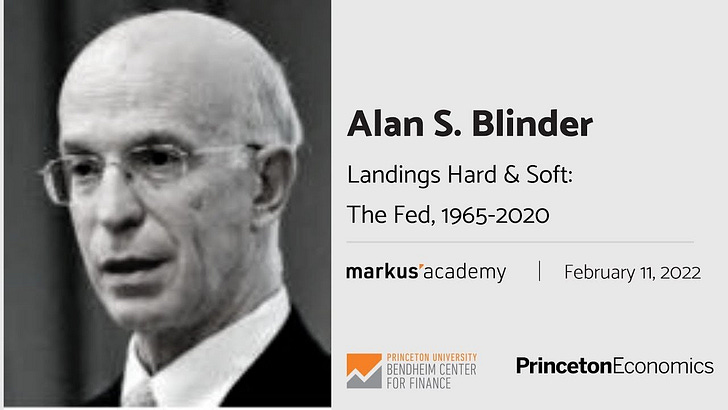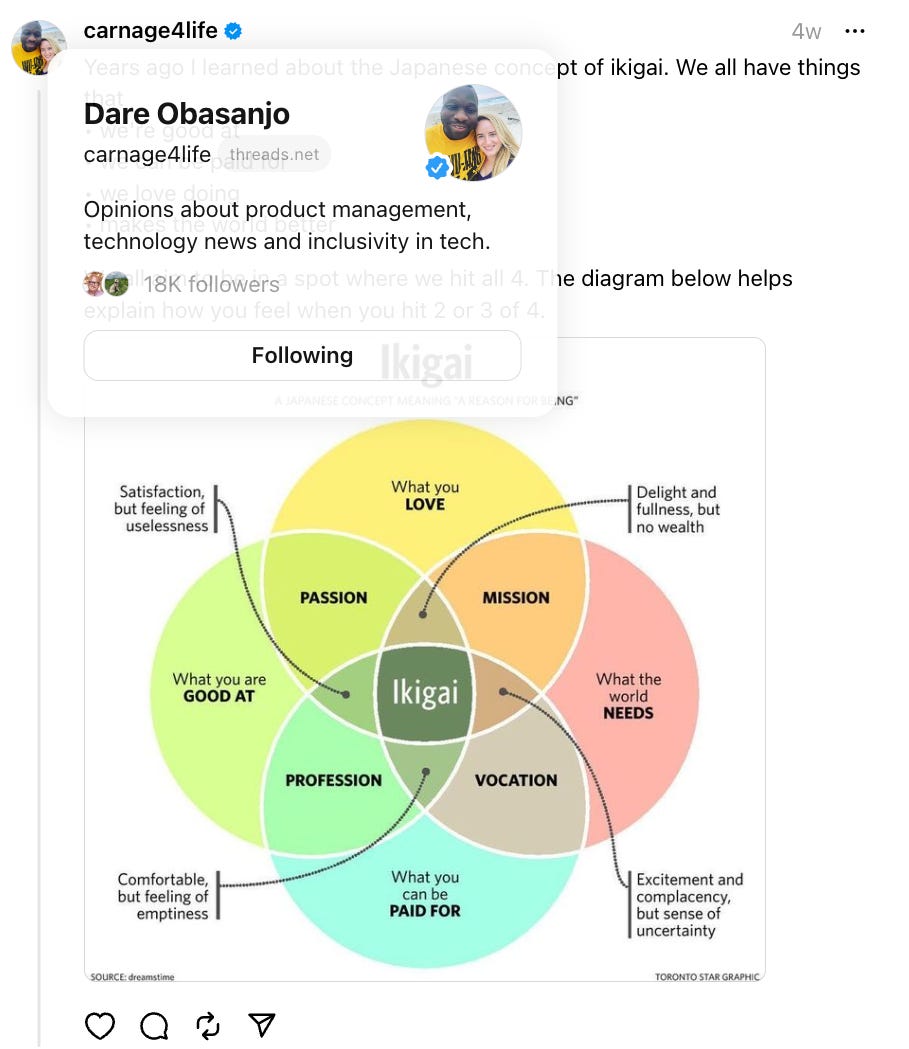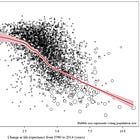BRIEFLY NOTED: For 2023-11-28 Tu
Of course you slow your descent rate on final approach if you are trying for a soft landing; Sean Carroll has a smart take on GPT-LLM-ML; fourth wall-breaking by Herman Wouk; Emily Bender...
Of course you slow your descent rate on final approach if you are trying for a soft landing; Sean Carroll has a smart take on GPT-LLM-ML; fourth wall-breaking by Herman Wouk; Emily Bender criticizes the AI-hype machine; Alan Blinder on landing the macroeconomy; Dare Obasanjo points us at Ikigai; very briefly noted; & interesting economic history job market papers, & BRIEFLY NOTED: For 2023-11-24 Fr…
SubStack NOTES:
Journamalism: Am I wrong in thinking that this is just bonkers? That the very basics of doing things in the world is that the non-insane slow down as you approach your target? Does Chris Anstey try to roar up to the stop sign at 60 mph and then slam on the brakes 10 feet before? Do planes descend at 3000 feet per minute until just before they touch down? No. So just WTF is going on here? It is flexible inflation targeting. This has always been the plan:
GPT-LLM-ML: A very nice—by which I mean “I agree with 99.99% of it, and it is better-expressed than I could have expressed it”—solo edition by Sean Carroll of Johns Hopkins of his Mindscape podcast, on what he calls “AI”, but which I would urge him—by virtue of his own principal that the proper Rectification of Names is important—to join me in calling GPT-LLM-ML. I am reassured that he ultimately comes down where I came down: that the remarkable success of ChatGPT at blathering persuasively is strong evidence that most of our use of language is better-described as “Stochastic Parrotage” than as Turing-class entity thought:
Literature: This, at the very end of the second volume, War and Remembrance, of Herman Wouk’s Winds of War, is the best fourth wall-breaking I can ever remember reading:
GPT-LLM-ML: I think this from Emily Bender gets it right. If I have learned anything important from analyzing how ChatGPT succeeds, it is that even more of reading takes place between the ears of the reader than I had thought—and I had already thought a lot of reading takes place between the ears of the reader:
ONE VIDEO: Alan Blinder on Landings Hard & Soft:
ONE IMAGE: Ikigai:
Very Briefly Noted:
Economics: Nick Timiraos: The Hidden Hero Fueling Soft-Landing Hopes: A Boost in Supply <https://www.wsj.com/economy/central-banking/the-hidden-hero-fueling-soft-landing-hopes-a-boost-in-supply-3a32bf3e>: ‘Rising labor force, productivity lowered inflation despite still-strong growth, taking pressure off Fed to raise rates…. Potential growth is temporarily “elevated for a year or two right now over its trend level,” said Powell. “And that means you could be growing at 2% this year and still be growing below the increase in the potential output of the economy.” Powell was providing a narrative to explain Fed officials’ longstanding expectation that inflation could come down without the huge rise in unemployment…. The pandemic might have caused a one-time decline in the economy’s capacity to supply goods and services, and supply is now catching up…
Enda Curran: Let the 2024 Economic Predictions Game Begin <https://www.bloomberg.com/news/newsletters/2023-11-27/wall-street-economists-try-to-predict-2024-inflation-and-interest-rates>: ‘The year is ending on as good a note as could be expected. Shoppers eased up their spending in October and inflation continues to retreat, both core components of the soft landing the Fed is trying to pull off…. The biggest lesson from 2023 is that projections don’t necessarily correlate with performance…. “Our baseline ‘boil the frog’ narrative sees sluggish growth but sticky core inflation forcing central bankers to maintain restrictive stances,” according to JPMorgan’s economists. In plain English, that means it’s too soon to declare inflation is back under control and interest rates will come down…
Barry Ritholtz: The ‘Art’ of Market Timing <https://ritholtz.com/2023/11/the-art-of-market-timing/>: ‘Jeff Sommer discussed a DFA research paper on market timing; both are well worth your time to read…. Market timing is extremely difficult, very few people (if any) do it consistently well. Not only are the odds stacked against you, but very often systems that have successfully timed the market have been simply lucky, and do not succeed in out-of-sample tests…
Economic History: Vaclav Smil: Grand Transitions: ‘Best reconstructions put average annual growth rate of the global economic product at just 0.01% during the first millennium of the Common Era. At that rate the total product would take seven millennia to double, and even an order-of-magnitude improvement during the next 500 years brought the rate to only about 0.1% with doubling still taking seven centuries…
GPT-LLM-ML: Alfonso Reyes: Why Machine Learning is not Artificial Intelligence <https://oilgains.medium.com/why-machine-learning-is-not-artificial-intelligence-61b174a3c9a2>: ‘What we call AI today arose from the fields of pattern recognition, movement control and statistics. Although document retrieval, text classification, fraud detection, recommendation systems, personalized search, social network analysis, planning, diagnostics, and A/B testing are not AI but Machine Learning, they are very successful. And, still we insist in calling them AI…
John Quiggin: Machine learning is old hat <https://johnquigginblog.substack.com/p/machine-learning-is-old-hat>: ‘Machine learning is (mostly) a new label attached to estimation techniques that have been around for a century or more… variations on least-squares regression, developed by Laplace and Gauss in the early 19th century… [with] the most important variation… discriminant analysis… underlying pattern recognition… developed by Fisher in 1936…
Matt Levine: OpenAI Is Still an $86 Billion Nonprofit <https://www.bloomberg.com/opinion/articles/2023-11-27/openai-is-still-an-86-billion-nonprofit>: ‘At one point, the valuation of OpenAI was apparently zero dollars…. Investors were noisily saying that they were going to write down their shares to zero, and it looked like Microsoft Corp. was about to acquire most of OpenAI’s staff without paying the company (or its other investors) anything for them…. So how much should OpenAI be worth today? Some possible answers…. 10. Precisely $86 billion: Nothing worth thinking about happened over the last 10 days. I think that last answer is obviously insane but I am not a venture capitalist!… And yet!… The deal… Thrive Capital… $1 billion of stock… expected to close…. The Josh Kushner–run Thrive said they were impressed by the “resilience and strength” they witnessed over the last few days and that they “consider it a true honor to be their partners now and in the future.”… I suppose it is possible that the answer is “the distribution of possible OpenAI outcomes is much wider than it was 10 days ago, but the midpoint of that distribution is still $86 billion,” but what a weird coincidence that would be…
Good Old-Fashioned Effective Altruism: Matt Yglesias: GO-FEA <https://www.slowboring.com/p/thankful-mailbag>: ‘Meanwhile, over on the Good Old-Fashioned Effective Altruism side, things seem to be going well. Open Philanthropy just announced a few new programs in areas like developing country lead poisoning that are badly underfunded and neglected. This is good, important stuff. Obviously if a rogue AI kills everyone in 2037, nobody is going to care very much whether we promoted best practices around car battery recycling. But we have a very high degree of certainty that lead toxicity kills tons of kids and harms many more. And we know that the recycling of car batteries is a big source of that lead. And we know what the best practices are. So if we try to promote policies ensuring safe recycling of car batteries, we may fail, but we will probably make at least some progress and almost certainly not make things worse…
Public Reason: Richard Yeselson: ‘Cosmopolitan communitarianism
<https://twitter.com/yeselson/status/1728076088922833100>
is, as always, the challenge. Dominant, white cohort likes homogenous social democracy—welfare chauvinism in Europe and welfare gerontocracy in the US. They don’t like sharing it with people who don’t look like them, practice their religion…
Humphrey Appleby: ‘I'd be more sympathetic
<https://twitter.com/bdquinn/status/1728089207069929629>
to the desire of people to seek out non-mainstream sources of information if the non-mainstream sources didn't go: "The establishment wants you to believe the Sun is 330,000 times the mass of the Earth. How? Look at it in the sky! It's so small!”…








Off topic, but I thought Prof. DeLong should see this:
https://www.theatlantic.com/ideas/archive/2023/11/substack-extremism-nazi-white-supremacy-newsletters/676156/
"The pandemic might have caused a one-time decline in the economy’s capacity to supply goods and services, and supply is now catching up…" Isn't that what "temporary" as in temporarily-above-target means? Now it does not explain the details, whether some of the above target inflation might have been a mistake.